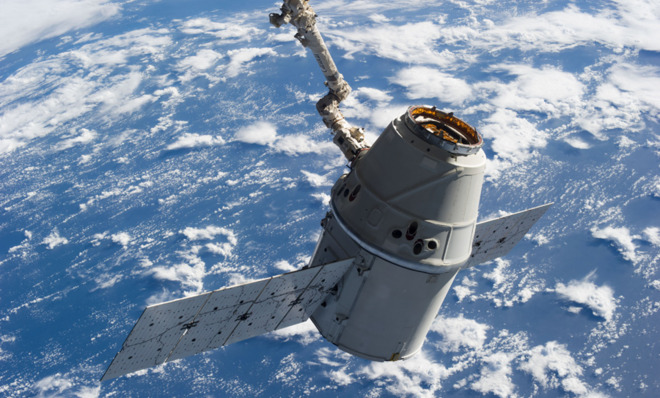The surprise winner of America's fallout with Russia: the U.S. space industry
No, the U.S. doesn't need a giant "trampoline" to get to space. It has Elon Musk.

A free daily email with the biggest news stories of the day – and the best features from TheWeek.com
You are now subscribed
Your newsletter sign-up was successful
Since the U.S. space shuttle fleet was taken out of service in 2011, the U.S. has been dependent on Russian rockets to get into space. On average, the U.S. pays Russia $71 million per person for a ride to the International Space Station. And the U.S. has been a loyal customer — right now, the U.S. has an outstanding bill of $457.9 million for Russia's services.
But all of that has been completely thrown up in the air by the crisis in Ukraine, where the two countries have been widely at odds. The U.S. has punished Russia with sanctions for annexing Crimea and supporting secessionist paramilitaries in eastern Ukraine, while Russia has lambasted the U.S. for "running the show" behind the scenes and rolled out NSA-leaker Edward Snowden to figuratively poke Obama in the eye.
Underscoring how deep the divisions have become, Russia’s deputy prime minister, Dmitry Rogozin — the head of the Russian space program and a target of U.S. sanctions — sarcastically suggested two days ago that America may need to find a large trampoline to continue NASA’s access to the International Space Station.
The Week
Escape your echo chamber. Get the facts behind the news, plus analysis from multiple perspectives.

Sign up for The Week's Free Newsletters
From our morning news briefing to a weekly Good News Newsletter, get the best of The Week delivered directly to your inbox.
From our morning news briefing to a weekly Good News Newsletter, get the best of The Week delivered directly to your inbox.
Rogozin tweeted: "After analyzing the sanctions against our space industry, I suggest to the USA to bring their astronauts to the International Space Station using a trampoline." He also threatened that sanctions against Russia would have a negative effect on NASA and Europe's space effort, saying, "the sanctions will hit them like a boomerang."
But Rogozin may have totally missed the point. The fallout between the U.S. and Russia may be reawakening the U.S. to the necessity of having independent spacefaring capabilities. And the newly emerging private space sector is quickly building toward exactly that. SpaceX and Tesla CEO Elon Musk — who has himself been pretty critical of Putin and Russia's policies in Ukraine — tweeted the same day:
This has been long coming. The U.S. private space industry has gradually built up a head of steam in the last 10 years. In May 2012, SpaceX’s Falcon 9 rocket successfully propelled the Dragon spacecraft into orbit, and successfully docked with the International Space Station. That success has been followed by subsequent trips, with the Dragon carrying cargo to and from the ISS.
In fact, since the Ukraine crisis began, NASA has extended multi-billion dollar resupply contracts for American private space contractors SpaceX and its competitor Orbital for 24 months from December 2015 to December 2017. It's also preparing a follow-up contract that would cover deliveries to the space station from 2017 to 2024. NASA envisions four to five private resupply flights a year, funded through a program budget of between $1 billion and $1.4 billion.
A free daily email with the biggest news stories of the day – and the best features from TheWeek.com
And just yesterday, Congress proposed a measure to develop a new liquid fuel rocket engine within the next five years to cut America's reliance on Russian technology. The new measure would authorize Defense Secretary Chuck Hagel to spend $220 million to fund the domestic development of a liquid rocket engine. Putin's actions mean "we should be looking desperately for competition" in space launches, Sen. McCain (R-Ariz.) said yesterday. As Reuters reports, America's reliance on Russian engines has been a "long-time concern for lawmakers," but those worries have come to the fore after Russian actions in Ukraine.
Meanwhile, SpaceX plans to test its first Dragon flight with humans as early as 2015. The final product is designed to carry seven astronauts to and from the ISS, making that "trampoline" a bit unnecessary after all.
But kudos to Rogozin for lighting a fire. We shouldn’t forget that humanity's greatest spacefaring triumph — landing humans on the moon — was spurred by rivalry rather than co-operation between the U.S. and the Soviet Union. Rivalry — wanting to be the first and best — is a very strong incentive to achieve, to push the threshold of possibility. If the U.S. really is in the midst of new Cold War with Russia, then perhaps another space race is just around the corner, too.
John Aziz is the economics and business correspondent at TheWeek.com. He is also an associate editor at Pieria.co.uk. Previously his work has appeared on Business Insider, Zero Hedge, and Noahpinion.
-
 How the FCC’s ‘equal time’ rule works
How the FCC’s ‘equal time’ rule worksIn the Spotlight The law is at the heart of the Colbert-CBS conflict
-
 What is the endgame in the DHS shutdown?
What is the endgame in the DHS shutdown?Today’s Big Question Democrats want to rein in ICE’s immigration crackdown
-
 ‘Poor time management isn’t just an inconvenience’
‘Poor time management isn’t just an inconvenience’Instant Opinion Opinion, comment and editorials of the day